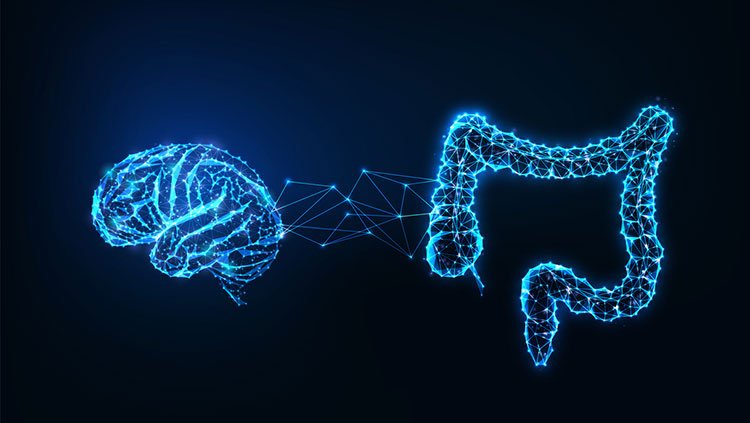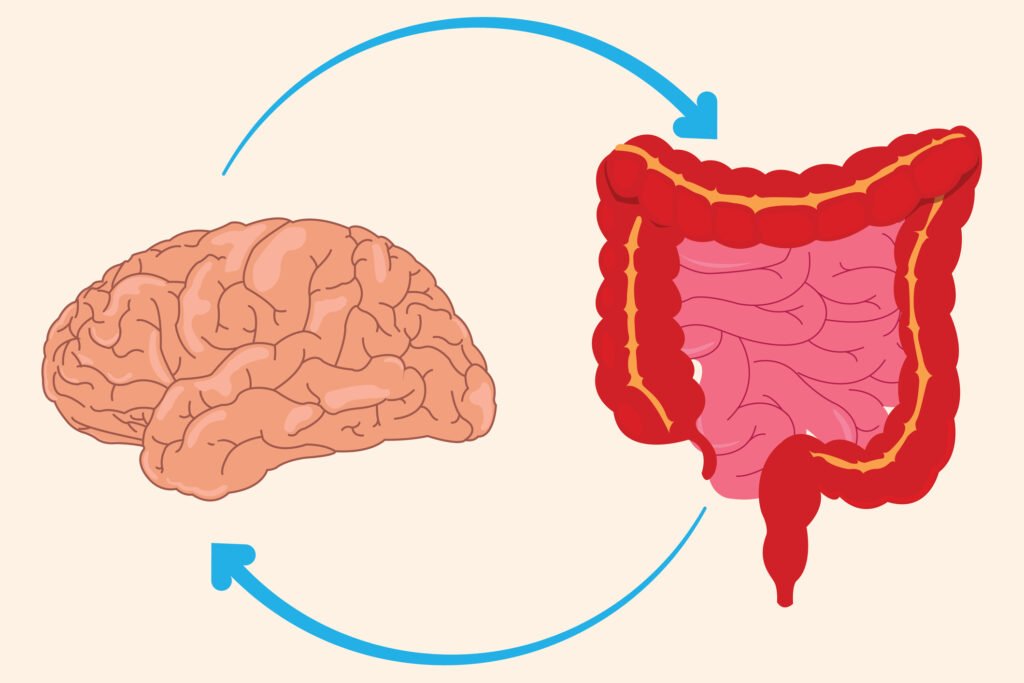
Why this matters now
If you’ve ever had “butterflies” before a big meeting or lost your appetite under stress, you’ve felt the gut–brain connection in action. Today, research goes far beyond metaphors: the microbiota–gut–brain axis is a two-way communication network involving nerves, hormones, and immune signals that can influence mood, stress responses, sleep, and cognition. Harvard clinicians describe this as a genuine bidirectional loop—the brain affects gut function, and the gut can send signals that shape how we feel and think.
How your gut “talks” to your brain
Three main channels carry gut signals upstairs:
- Neural pathways (especially the vagus nerve). This long cranial nerve ferries real-time status updates from the GI tract to brain areas involved in emotion and autonomic control; newer reviews highlight how vagal tone and gut signals interact with serotonin pathways.
- Immune and inflammatory signaling. An imbalanced microbiome (dysbiosis) can increase gut permeability and inflammatory mediators that, in turn, influence brain circuits involved in anxiety and depression.
- Microbial metabolites. Gut bacteria produce short-chain fatty acids (SCFAs) and other compounds that may modulate neuroinflammation, reinforce the blood–brain barrier, and fine-tune neurotransmitter systems. Recent research continues to map SCFAs’ neuroprotective potential.
What the evidence says (and where it’s still emerging)
- Observational links. Large cohort studies and microbiome-wide association work suggest specific microbial patterns correlate with depressive symptoms, even after accounting for lifestyle factors; they also flag taxa that might be causally involved. Correlation isn’t causation, but the signal is consistent across datasets.
- Dietary trials. In the landmark SMILES randomized controlled trial, an adjunctive Mediterranean-style diet improved depressive symptoms versus social support control—an early proof that nutrition can move the needle for some people. Follow-on studies suggest Mediterranean-pattern guidance may modestly help mood while improving weight and metabolic risk.
- Psychobiotics (probiotics for mental health). A 2025 umbrella review and recent systematic analyses report small-to-moderate reductions in depressive and anxiety symptoms with certain probiotic strains (often Lactobacillus and Bifidobacterium), while prebiotics show more variable effects. Benefits are strain-specific, dose-dependent, and not universal—highlighting the need for personalization.
- Advanced interventions. Early studies are exploring fecal microbiota transplantation (FMT) and other microbiome-targeted therapies for mood symptoms in select conditions; promising signals exist, but these approaches remain investigational and should be limited to clinical trials or approved indications.
Bottom line: the gut–brain link is real but best supported by whole-diet and lifestyle changes first; microbes and their metabolites appear to contribute to mental health in meaningful—but still partly mapped—ways.

Practical steps with scientific grounding
1) Build a microbiome-friendly plate
Pattern, not perfection, drives results. Center meals on vegetables, legumes, nuts, seeds, whole grains, olive oil, and fish—a Mediterranean-leaning template repeatedly associated with better mood outcomes and reduced inflammation. Diversity of fibers feeds diverse microbes, which may support more resilient signaling along the gut–brain axis.
2) Add fermented foods—mindfully.
Yogurt, kefir, kimchi, sauerkraut, idli/dosa batter, and tempeh deliver live microbes and bioactive peptides that interact with the gut lining and immune pathways. Start with one small daily serving and rotate types. If you’re salt-sensitive or histamine-reactive, choose lower-sodium, fresh ferments and monitor symptoms.
3) Consider targeted psychobiotics (with your clinician).
Some probiotic strains show benefits for anxiety and depression in meta-analyses, but results vary. If you trial a product, look for labeled strains used in studies, take it daily for 4–8 weeks, and track mood, sleep, and GI changes. Discontinue if you notice side effects or no benefit. Do not replace prescribed therapy with probiotics; think “adjunct,” not “either/or.”
4) Feed your microbes the right fibers.
Prebiotic-rich foods (onions, garlic, leeks, asparagus, bananas, oats, and legumes) help microbes produce SCFAs linked with calmer immune activity and potentially improved stress responses. If you’re sensitive to FODMAPs, work with a dietitian to personalize fiber types and amounts.
5) Train the axis beyond food
- Sleep: Irregular sleep disrupts microbial rhythms and stress chemistry.
- Movement: Regular aerobic and resistance activity is tied to higher microbial diversity and better mood.
- Stress skills: Breathwork and vagus-nerve–supportive practices (slow nasal breathing, humming, and cold face splashes) can modulate autonomic tone and complement dietary work.
Who should be extra cautious?
- Immunocompromised individuals and those with critical illness should not self-start probiotics without medical supervision.
- People with IBD, IBS, SIBO, or significant food sensitivities benefit from a tailored plan with a registered dietitian.
- Those with thyroid disorders or those on strict iodine control should be prudent with seaweed and certain supplements often marketed for “gut health.” (Personalization beats blanket rules.)
The expert view: what’s truly “proven” vs. “promising”Proven enough to act on now: adopt a Mediterranean-style dietary pattern; prioritize fiber diversity; include modest amounts of fermented foods; align sleep, movement, and stress care. These steps support both gut health and mental health, and their broader cardiometabolic upsides are well documented.
Promising but not yet prescriptive: condition-specific psychobiotics, postbiotics, and microbiome-targeted therapeutics (including FMT) for mood disorders. Participate through clinical care if appropriate, and watch for strain-specific guidance as trials mature.











